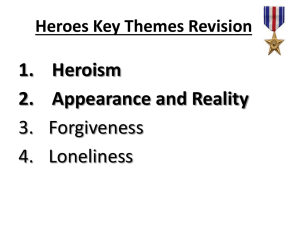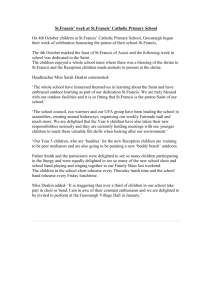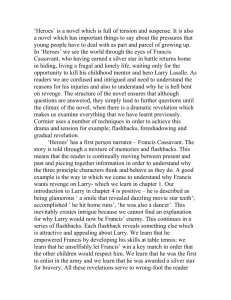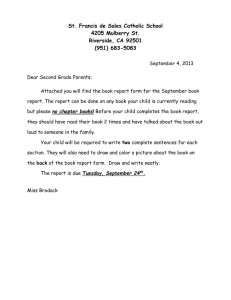Robert Cormier – Background information.
advertisement
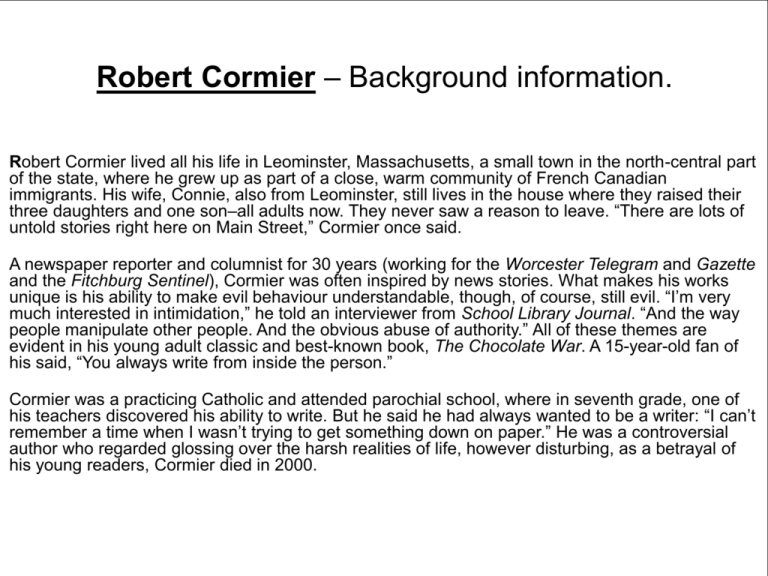
Robert Cormier – Background information. Robert Cormier lived all his life in Leominster, Massachusetts, a small town in the north-central part of the state, where he grew up as part of a close, warm community of French Canadian immigrants. His wife, Connie, also from Leominster, still lives in the house where they raised their three daughters and one son–all adults now. They never saw a reason to leave. “There are lots of untold stories right here on Main Street,” Cormier once said. A newspaper reporter and columnist for 30 years (working for the Worcester Telegram and Gazette and the Fitchburg Sentinel), Cormier was often inspired by news stories. What makes his works unique is his ability to make evil behaviour understandable, though, of course, still evil. “I’m very much interested in intimidation,” he told an interviewer from School Library Journal. “And the way people manipulate other people. And the obvious abuse of authority.” All of these themes are evident in his young adult classic and best-known book, The Chocolate War. A 15-year-old fan of his said, “You always write from inside the person.” Cormier was a practicing Catholic and attended parochial school, where in seventh grade, one of his teachers discovered his ability to write. But he said he had always wanted to be a writer: “I can’t remember a time when I wasn’t trying to get something down on paper.” He was a controversial author who regarded glossing over the harsh realities of life, however disturbing, as a betrayal of his young readers, Cormier died in 2000. Francis describes in stark and brutal detail his injuries sustained during the war and how after the war he came to lodge with Mrs Belander in Frenchtown where he lived as a boy. He visits the church and says prayers for various important people in his life; thus we are introduced to some major and minor characters: Enrico, his mother and father, whom we learn are dead, and Nicole Renard and Larry LaSalle. Tension is created- he states his intention of killing Larry, but at this stage we do not know why. A flashback to the war introduces the theme of heroismFrancis has a Silver Star Medal, although he refuses to believe himself heroic – and reveals his love for Nicole. Francis reminisces about meeting Nicole for the first time, and his adolescent desperation to talk to her. This leads to a description of his childhood in Frenchtown. On many levels ‘Heroes’ is a coming of age novel. Francis feelings towards Nicole are innocent and a natural part of growing up. He describes his love very much in an idealised way – look at the reference to knights – and he describes Nicole as having a ‘ pale purity’. This innocence is an important contrast to the things that both have to deal with as they are initiated into the realities of a more hard edged world. This is their journey His catholic education is also important as this too informs his reactions. We know that as an outsider Larry does not share the values of this community. This may explain his ability to be able to distance himself from the rape ‘ that one sin’, may also explain why he is able to move on – Cormier hints that he has been an outsider in many communities – tasted the ‘ sweet young things’ and moved on. There is a hint that he is from Frenchtown – this may be significant as this is the place where he starts his journey and having failed to learn his lesson ends his journey. Francis disguises himself to walk through the town he grew up in- he fears recognition. He visits the building where Nicole lived as a child. In a flashback, he recalls discussing Nicole with a soldier from his hometown. During his time at war. We learn that he joined the army at 15, lying about his age. Back in the present, Francis is told that Nicole’s family left the area some time before. Back in his lodgings, Francis talks with Mrs Belander who feels sorry for his injuries. Francis goes to bed and dreams of his war time experiences- describing them in graphic detail. His description of the time of losing his face is particularly stark and brutal. This has a very cinematic quality in that Cormier is using the dialogue between Norman and Francis to fill in the ‘back’ story…this applies throughout the The meshing together of the war and Francis’s present life is also a techniques whereby Cormier shows how unpleasant Francis’s life has become, because he does not seem to be able to find escape anywhere. He is presented very much as a ‘tortured’ soul Francis introduces the Wreck Centre- a key place in his childhood and in this story. Francis meets Arthur Rivier who buys him a drink, and he describes the conversation with the local men, who reminisce about their school days. None of them recognises him, and he talks very little, wanting to glean information about Larry LaSalle. At the end of the conversation he heads for the Wreck Centre, despite having told himself that he will not go there. Francis choice to hide himself from the his friends is a powerful reminder of his shame and guilt. During his childhood Francis hid because he was shy. He then hid whilst Nicole was being raped. He now hides behind a scarf Metaphorically he’ has no face’ thus is not able to take joy from camaraderie. Cormier may be suggesting that some traumas can be so damaging that they stop us from functioning normally. If we link this to Francis’s learning journey then this despair could be read as the old Francis having to die, literally or metaphorically- which in effect he does before he can move on. Thus when Francis has confronted Larry and Nicole forgives him then he is able to become a new person? Francis introduces the Wreck Centre- a key place in his childhood and in this story. Francis meets Arthur Rivier who buys him a drink, and he describes the conversation with the local men, who reminisce about their school days. None of them recognises him, and he talks very little, wanting to glean information about Larry LaSalle. At the end of the conversation he heads for the Wreck Centre, despite having told himself that he will not go there. Arthur Revier is another example of the theme – War’s consequences. Before the war he is a star baseman – after the war he has a broken figure ‘ with bloodshot, bleary eyes’ someone who hides from his memories through drink. It is Arthur who recognises that ‘ We weren’t heroes. The Strangler and his scrap – book. No heroes in that scrap – book, Francis. Only us, the boys of Frenchtown. Scared and homesick and cramps in the stomach and vomit. Nothing glamorous like the write –ups in the papers or the newsreels. We weren’t heroes. We were only there…’ And Cormier also gives us an insight into why he feels this way when Arthur complains ‘Nobody talks about the war.’ This links with the way that Francis and Nicole deal with their trauma – through silence. Shame silences and makes us suffer even more… • • • • • • • • 12 Still in the past, during a heat wave, Francis waits for Nicole outside her house for three days, wracked with guilt that he did nothing to protect her. When he finally sees her, Nicole is disgusted with him and tells him to leave. He goes to church, thinking to commit suicide by leaping from the steeple, but instead enlists in the army. Note how the concept of heroes is referred to increasingly often. The themes of Love and Hate and Guilt are touched upon. as a child. He lies about the severity of his injuries 13 Back in the present, Francis finally tracks down Larry by eavesdropping into a conversation between Mrs Belander and a neighbour. 14 Francis finds Larry and confronts him. Larry is initially pleased to see him, and they discuss the idea of heroes. Francis dismissed the idea of himself as a hero as ‘fake’, and quickly confronts Larry with his actions against Nicole. Larry attempts to explain his actions, but Francis (and the reader) find his explanation repugnant. The idea of heroes takes on a different slant as we are reminded that Larry was not just a war hero, but also the children’s hero. Larry wipes out any chance to redeem his heroic status by remaining unrepentant – he thinks that his many good points outweigh his sickening actions: “Does that one sin of mine wipe away all the good things?” Francis does not kill Larry, who tries to assure him that he is indeed a hero. It seems pointless, when Larry frequently contemplates suicide 15 Back in the present, Francis attempts to discover Nicole’s whereabouts by asking at the convent he attended • • • • • • • • 5 Francis describes the Wreck Centre- it is now boarded up and run down. In reminiscence he recalls the ‘tragic story’ that caused the Centre to be closed down, before Larry LaSalle started activities for the local children there. The flattering description of Larry comes as a surprise and wrong-foots the reader, as we know Francis’ intention of killing him. Further surprises come- Larry, it transpires was an inspirational figure to the children and helped to bring out the best in each individual. Note however the foreshadowing- there are rumours that Larry has “gotten into trouble in New York City”. This raises questions in the mind of the reader as to his past. Back in the present, Francis recalls that Joey LeBlanc felt a sense of doom about the place, and that he died in the war. He now feels that Joey was right about the place- again creating suspense and raising questions in the mind of the reader. 6 Francis has now been in his hometown for a month and he watches for Larry. He asks about him in the bar he frequents, and we learn of Larry’s heroism during the war and the medal he was awarded for bravery. The concept of heroes is further explored as Arthur declares Francis a hero for his actions in the war. The themes of disguise and appearance and reality are explored- Francis wishes his identity to remain secret while Larry’s actions have made headlines. The chapter closes by introducing Francis’ skill at table tennis. 7 In a flashback, Francis recalls Larry’s encouragement of his ability as a table tennis player at The Wreck Centre. Larry allows Francis to win a competition in a totally selfless act, and tells him that he and Nicole are “special“ to him. Nicole is delighted to see Francis win and they appear to be becoming closer. 8 Francis finds Arthur drunk; he comments that no one will talk about the war. The theme of heroism continues as Arthur states that there were no heroes in the warjust scared, homesick boys. The cold weather mirrors the sombre mood of this short chapter. • • • Again in the past, Francis describes that Larry was one of the first men to enlist in the war. This again creates conflict in the reader’s mind as Larry is once again described in glowing terms. Thus the theme of appearance and reality is touched upon once again. With Larry gone the Wreck Centre is closed and preparations for the war are stepped up. Francis becomes closer to Nicole as the townspeople discuss the war’s progress. Nicole tells Francis of Larry’s heroic actions; in contrast to Francis’ later hiding of his face, Larry’s stares out at them from a cinema screen on a newsreel. Francis describes how he came to hide his face, after realising the horror it caused those who saw it. He doesn’t care about healing- his only concern is to track down Larry LaSalle. Touching on the theme of Appearance and Reality, Francis stars into the mirror and sees only a stranger. This symbolises the changes in him owing to the war, and furthers the theme of War’s Consequences. This theme is further explored as we learn of Enrico’s decision to commit suicide as a result of his appalling injuries. Francis creates suspense by commenting that Larry’s homecoming “changed our lives for ever.” As Francis reminisces, Larry is described in a heroic manner as he comes home for his first leave. He wishes to spend time with his “Wreck Centre gang”, and he plays table tennis with them. But then Larry expresses his wish to have one last dance with Nicole. He dismisses Francis and rapes Nicole, who feels Francis has betrayed her by leaving the room. • 16 • Francis finds Nicole and again lies about his injuries. She apologises to him for the way she treated him on the day she was raped, and Francis tells her that Larry is dead. Nicole has not told anyone about the rape, and she appears damaged by her experience. Nicole calls him a hero, although Francis again denies it. She urges him to write about his experiences. The two part and he knows that they will not meet again. • 17 • Francis is at a railway station, watching soldiers and reminiscing about his old platoon. He considers that many of them who received no honours were the real heroes. The novel ends on a positive note as Francis considers the possibilities of recovery and of a future life. Francis The scarf is white and silk like the aviators wore in their airplanes back during the first world war, over the battlefields and trenches of Europe. I like to think that it flows behind me in the wind when I walk but I guess it doesn’t. pg2 Then I think again of what Sister Gertrude taught us in the third grade, words she said came from the mouth of Jesus. Pray for your enemies, for those who have done you harm. It is easy to pray for your enemies, for those who have done you harm. It is easy to pray for those you love, she said. But it counts more to pray for those who don’t love you, that you don’t love. pg5 I am not a hero of course, and I turn away in disgust, pg7 I knelt their like a knight at her feet, her sword having touched my shoulder. I silently pledged her my love and loyalty for ever. Pg8 Themes Appearance and reality. All the characters in the novel have a public face and a private face. Francis Larry Nicole The men who have returned from the war
